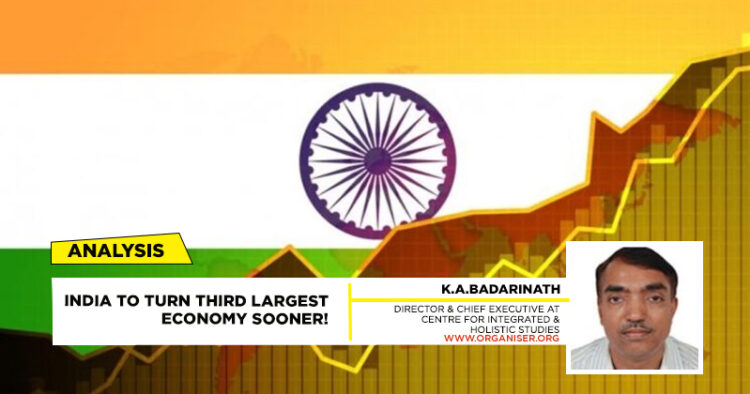Three significant developments were reported in last couple days. All the three relating to economy are intrinsically linked and have long lasting impact globally.
Japanese economy contracted for two consecutive quarters ending 2023 and reported recession. Embattled United Kingdom has also officially shifted into recession hit zone after last two quarters of
2023.
This has had its immediate impact. Japan moved to fourth position in global economic sweepstakes while Germany moved up the rankings to third place.
All these were prominently reported in last two days thereby leading to questions on Indian economy’s future as we head for another Lok Sabha elections in next two months.
Firstly, United Kingdom moved from stagnation to recession after economic contraction of 0.1 per cent (July – September 2023) and 0.3 per cent (October – December 2023). Loss of appetite for goods and services leading to negative consumer sentiment and political slugfest between Tories and Labour ahead of this year’s elections contributed to the recession that Bank of England and analysts prefer to term as ‘technical’. Prime Minister Rishi Sunak however is gung-ho about the prospects going forward.
Secondly, the curious case of Japan needs significant explanation. Aging population, Negative growth in its numbers for nth year, scarcity of workers impacting output to Yen’s valuation vis-à-vis the US greenback have been identified as major factors. Japan’s economy shrank by 3.3 per cent (July – September 2023) and 0.4 per cent in October – December 2023. Yen depreciation has impacted valuations across the spectrum. During last one year or more, Yen has reported depreciation of 20 per cent against major currencies while its 30 per cent against US dollar.
On October 20, 2022, Yen slipped to its worst levels at 150 as against US dollar. In the last one week, it has been hovering around 104.7 – 105 against the US dollar. Yen depreciation vis-à-vis US dollar is significant given that Japan imports big from United States both food and energy products.
Thirdly, Germany moving in as third biggest economy at 4.55 trillion dollar as against 4.19 trillion dollar of Japan is significant for more than one reasons. While Yen’s continued depreciation played a big part in Japan’s GDP, Germany’s performance on economic front has been modest while dealing with its labour issues, human resources shortages and euro valuations.
German economy has had contracted by 0.3 per cent in 2023 while analysts expect a modest positive growth of 0.3 per cent in 2024 followed by 1.2 per cent in 2025. Trade driven recovery may be expected in Germany. But, fingers are crossed given the demand slump internationally and production woes in Germany.
There’s a fourth factor that’s discussed intermittently and rather in subdued voices. US, the largest economy, seems to have avoided recession in 2023 with a soft landing and there’s likelihood of slipping into contraction mode this year. Some do suggest that US economy was already on decline owing to high inflation, retail prices though officially there’s no word on it as of now.
Fifth big factor is China that has gone through a lot in last several months over a year. Chinese economy, the second largest globally, may expand by 4.6 per cent in 2024 and 4 per cent in 2025. Where does it leave the dragon economy in the Year of Dragon that foresees everything good? Protracted Covid related restrictions have subdued the Chinese economy under President Xi Jingping though officially the economy expanded 5.6 per cent in 2023. International Monetary Fund does not believe these figures and it has its own data points that estimate a much lower expansion.
In this backdrop, what happens in India will be more than interesting to watch for both Indians and global populace looking for a straw of support in their struggle to counter the global downturn on economic
front.
With El Nino receding and monsoon forecast being very positive, India will continue to be the ‘brightest star’ with 6.5 – 7 per cent growth. Apart from being the fastest growing economy, India induced expansion is bound to keep the tide on positive side globally.
However, global headwinds cannot be wished away. Russia and Ukraine war is not coming to an end any time now while the second bloody conflict between Hamas and Israel gets only worse. Shipping lines on international waters especially in the Red Sea are impacted thereby safe movement of vessels has been constricted.
Also, Reserve Bank of India (RBI) has established its own track record, worked independent of Federal Reserve and European Central Bank on the monetary policy issues. Continued strong domestic consumption, expansion in goods & services output coupled with healthy capital inflows – both domestic and foreign – will only keep
the Indian economic wheel on even keel.
In this backdrop, stable and strong political dispensation lends strength to argue that overtaking both Japan and Germany to become third largest economy globally by 2027 or a wee bit earlier is credible.
Prime Minister Narendra Modi has promised within and outside Parliament that Bharat will be third largest economy in his third term with over 5 trilliondollar valuation.
Strong fundamentals and resilient economic order coupled with a reformer in Prime Minister Modi would help hasten the process. If global upturn happens in next few years as estimated by some economists, then India’s place under the Sun is assured sooner than later.
(author is Director & Chief Executive with New Delhi based nonpartisan think-tank, Centre for Integrated and Holistic Studies)




















Comments